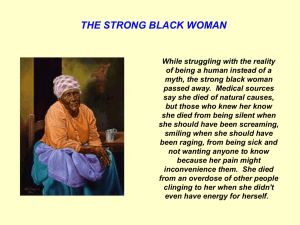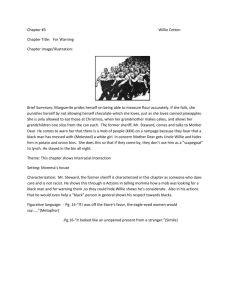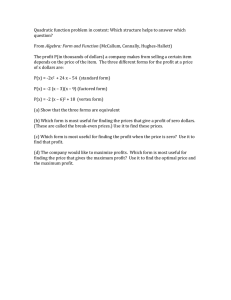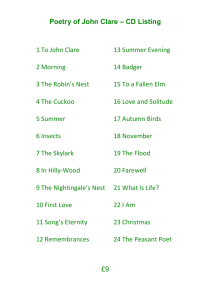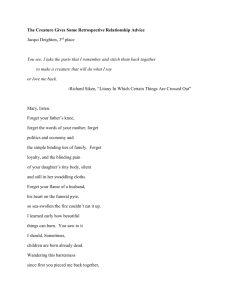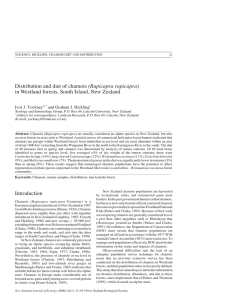EN2133 Summer Examinations 2015 US Writing and Culture, 1780-1920 – Non-Finalists
advertisement
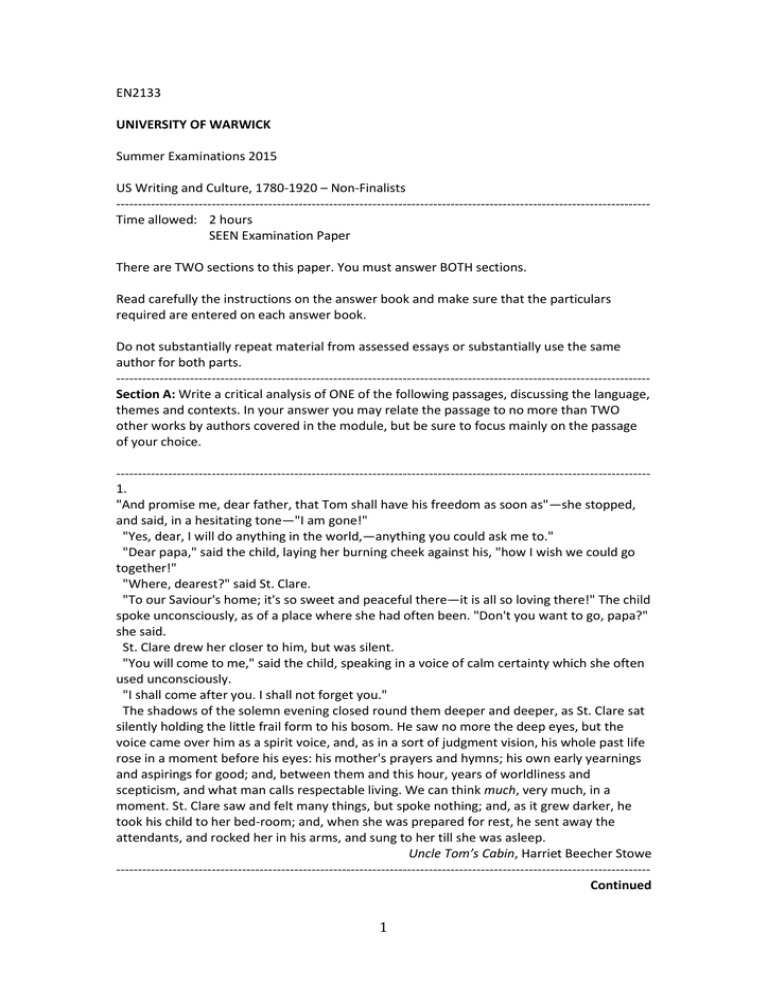
EN2133 UNIVERSITY OF WARWICK Summer Examinations 2015 US Writing and Culture, 1780-1920 – Non-Finalists --------------------------------------------------------------------------------------------------------------------------Time allowed: 2 hours SEEN Examination Paper There are TWO sections to this paper. You must answer BOTH sections. Read carefully the instructions on the answer book and make sure that the particulars required are entered on each answer book. Do not substantially repeat material from assessed essays or substantially use the same author for both parts. --------------------------------------------------------------------------------------------------------------------------Section A: Write a critical analysis of ONE of the following passages, discussing the language, themes and contexts. In your answer you may relate the passage to no more than TWO other works by authors covered in the module, but be sure to focus mainly on the passage of your choice. --------------------------------------------------------------------------------------------------------------------------1. "And promise me, dear father, that Tom shall have his freedom as soon as"—she stopped, and said, in a hesitating tone—"I am gone!" "Yes, dear, I will do anything in the world,—anything you could ask me to." "Dear papa," said the child, laying her burning cheek against his, "how I wish we could go together!" "Where, dearest?" said St. Clare. "To our Saviour's home; it's so sweet and peaceful there—it is all so loving there!" The child spoke unconsciously, as of a place where she had often been. "Don't you want to go, papa?" she said. St. Clare drew her closer to him, but was silent. "You will come to me," said the child, speaking in a voice of calm certainty which she often used unconsciously. "I shall come after you. I shall not forget you." The shadows of the solemn evening closed round them deeper and deeper, as St. Clare sat silently holding the little frail form to his bosom. He saw no more the deep eyes, but the voice came over him as a spirit voice, and, as in a sort of judgment vision, his whole past life rose in a moment before his eyes: his mother's prayers and hymns; his own early yearnings and aspirings for good; and, between them and this hour, years of worldliness and scepticism, and what man calls respectable living. We can think much, very much, in a moment. St. Clare saw and felt many things, but spoke nothing; and, as it grew darker, he took his child to her bed-room; and, when she was prepared for rest, he sent away the attendants, and rocked her in his arms, and sung to her till she was asleep. Uncle Tom’s Cabin, Harriet Beecher Stowe --------------------------------------------------------------------------------------------------------------------------Continued 1 EN2133 2. It might have afforded him some consolation could he have known that Miss Bart had really meant to go to church. She had even risen earlier than usual in the execution of her purpose. She had an idea that the sight of her in a grey gown of devotional cut, with her famous lashes drooped above a prayer-book, would put the finishing touch to Mr Gryce's subjugation, and render inevitable a certain incident which she had resolved should form a part of the walk they were to take together after luncheon. Her intentions in short had never been more definite; but poor Lily, for all the hard glaze of her exterior, was inwardly as malleable as wax. Her faculty for adapting herself, for entering into other people's feelings, if it served her now and then in small contingencies, hampered her in the decisive moments of life. She was like a water-plant in the flux of the tides, and today the whole current of her mood was carrying her toward Lawrence Selden. Why had he come? Was it to see herself or Bertha Dorset? It was the last question which, at that moment, should have engaged her. She might better have contented herself with thinking that he had simply responded to the despairing summons of his hostess, anxious to interpose him between herself and the ill-humour of Mrs Dorset. But Lily had not rested till she learned from Mrs Trenor that Selden had come of his own accord. The House of Mirth, Edith Wharton --------------------------------------------------------------------------------------------------------------------------3. There can be no doubt of this: All America is divided into two classes,--the quality and the equality. The latter will always recognize the former when mistaken for it. Both will be with us until our women bear nothing but kings. It was through the Declaration of Independence that we Americans acknowledged the ETERNAL INEQUALITY of man. For by it we abolished a cut-and-dried aristocracy. We had seen little mere artificially held up in high places, and great men artificially held down in low places, and our own justice-loving hearts abhorred this violence to human nature. Therefore, we decreed that every man should thenceforth have equal liberty to find his own level. By this very decree we acknowledged and gave freedom to true aristocracy, saying, "Let the best man win, whoever he is." Let the best man win! That is America's word. That is true democracy. And true democracy and true aristocracy are one and the same thing. If anybody cannot see this, so much the worse for his eyesight. The above reflections occurred to me before reaching Billings, Montana, some three weeks after I had unexpectedly met the Virginian at Omaha, Nebraska. I had not known of that trust given to him by Judge Henry, which was taking him East. I was looking to ride with him before long among the clean hills of Sunk Creek. I supposed he was there. But I came upon him one morning in Colonel Cyrus Jones's eating palace. The Virginian, Owen Wister --------------------------------------------------------------------------------------------------------------------------4. At the very bottom of her trunk, under her bridal dress, she kept her savings. It was all in change--half dollars and dollars for the most part, with here and there a gold piece. Long since the little brass match-box had overflowed. Trina kept the surplus in a chamois-skin sack she had made from an old chest protector. Just now, yielding to an impulse which often seized her, she drew out the match-box and the chamois sack, and emptying the contents on the bed, counted them carefully. It came to one hundred and sixty-five dollars, all told. She counted it and recounted it and made little piles of it, and rubbed the gold pieces between the folds of her apron until they shone. Continued 2 EN2133 "Ah, yes, ten dollars is all I can afford to give Mac," said Trina, "and even then, think of it, ten dollars--it will be four or five months before I can save that again. But, dear old Mac, I know it would make him feel glad, and perhaps," she added, suddenly taken with an idea, "perhaps Mac will refuse to take it." She took a ten-dollar piece from the heap and put the rest away. Then she paused: "No, not the gold piece," she said to herself. "It's too pretty. He can have the silver." She made the change and counted out ten silver dollars into her palm. But what a difference it made in the appearance and weight of the little chamois bag! The bag was shrunken and withered, long wrinkles appeared running downward from the draw-string. It was a lamentable sight. Trina looked longingly at the ten broad pieces in her hand. Then suddenly all her intuitive desire of saving, her instinct of hoarding, her love of money for the money's sake, rose strong within her. "No, no, no," she said. "I can't do it. It may be mean, but I can't help it. It's stronger than I." She returned the money to the bag and locked it and the brass match-box in her trunk, turning the key with a long breath of satisfaction. She was a little troubled, however, as she went back into the sitting-room and took up her work. "I didn't use to be so stingy," she told herself. "Since I won in the lottery I've become a regular little miser. It's growing on me, but never mind, it's a good fault, and, anyhow, I can't help it.” McTeague, Frank Norris --------------------------------------------------------------------------------------------------------------------------SECTION B: Answer ONE of the following questions. Your answer should be based on a discussion of TWO or THREE texts on the module. Do not attempt to cover more than three texts at length. --------------------------------------------------------------------------------------------------------------------------1. Using one example from each genre, compare how two different genres offer a “solution” to one of the problems facing 19th-and early 20th-century America. ---------------------------------------------------------------------------------------------------------------- 2. Can violence be a redemptive force in the context of 19th-century American writing? Analyze its role. ---------------------------------------------------------------------------------------------------------------- 3. How is the cult of womanhood either critiqued or deployed in the 19th-century novel? ---------------------------------------------------------------------------------------------------------------- 4. How do US novels either use or alter the master-slave dynamic as set out by Hegel? ---------------------------------------------------------------------------------------------------------------- 5. Discuss how texts studied in this module engage with the contradictions entailed by the notion of the United States as, in the words of Thomas Jefferson, “an empire for liberty.” ---------------------------------------------------------------------------------------------------------------Continued 3 EN2133 6. Discuss the use of nature in two different texts. How do the novels discuss the relationship between human society and nature? ---------------------------------------------------------------------------------------------------------------End 4
